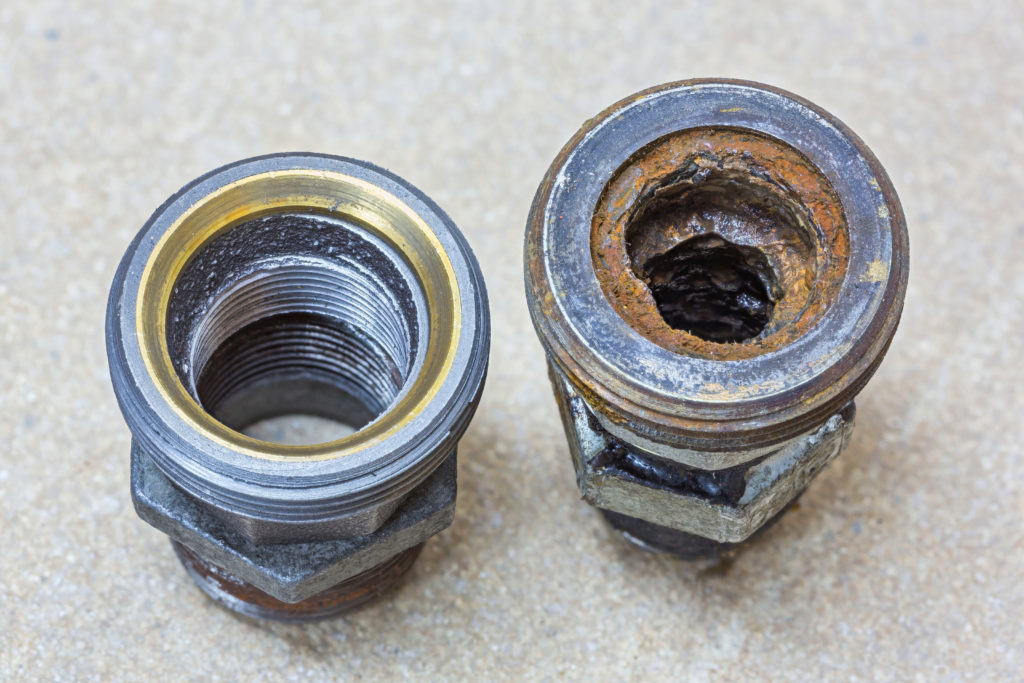Scaling vs. Corrosion: Why It Matters for Your Boiler Feed Water System
When using boilers for an industrial plant and process, one of the most important things to implement is the appropriate treatment of the boiler feed water before it has a chance to scale and corrode equipment. Before beginning any process with a boiler, understanding the makeup and return water chemistry/characteristics, the manufacturer’s requirements for the boiler (what pressure it should be run at, what water purity requirements are, etc.), and how this affects your feed water treatment options will save energy and help your plant avoid costly equipment replacements and treatments down the line.
Because the scope of this topic is so broad (there are many variations for boiler feed water treatment options depending on the type of boiler you have, the manufacturer’s recommendations, and feed water makeup quantity/quality, etc.), this article will focus on what scaling versus corrosion is and how they might affect your boiler feed water system in a general sense.
What is a boiler and how does it work?
A boiler is a device that generates steam by applying heat energy to water. The produced steam or heated water is then used for various industrial applications, such as electricity generation, pulp and paper processing, and cement production, to name a few.
A typical boiler will receive the feed water as a combination of fresh water (the plant’s water source, such as ground or surface water, that has been purified . . . typically with some type of raw water treatment system) and condensed water (the water being returned from the boiler steam process). Both types of water have their own set of impurities that can impact the efficiency your boiler, so understanding what is present in these streams is essential for designing the proper feed water treatment system.
After the feed water is taken into the boiler from the condensate and treated fresh water streams, a burner combines some type of fuel (such as oil, gas, or wood) with oxygen, while an ignition device facilitates combustion. The heat generated by this process then transfers to the water through a heat exchanger, thereby creating steam.
[Download our free boiler feed water treatment e-book.]
What causes scaling and why is it harmful to an industrial boiler?
Scaling is a deposit formed on the inside of piping and heat transfer surfaces when the water is heated and impurities precipitate or settle out. These deposits can build up and interfere with heat transfer or, in extreme cases, cause tube and system failure.
For example, if a power plant is drawing their process water from a river or lake, there could potentially be an assortment of suspended and colloidal solids present, such as silica. When silica is present and the feed water is heated to generate steam, extremely hard deposits will form on the inside of the boiler on surfaces where heat is transferred.
Some common feed water contaminants that cause scaling include:
-
-
- Silica
- Iron
- Calcium
- Magnesium
- Aluminum
-
The level of scaling on a boiler will be determined by the amount of these impurities in relation to the pressure a boiler is run at. For example, many higher pressure boilers will require a higher quality of water with less contaminants than some lower pressure boilers. Again, it’s important to check with your boiler manufacturer what their recommendations are.

What causes corrosion and why is it harmful to an industrial boiler?
Corrosion in boilers, or the breakdown of the metal elements of the device, can happen for a variety of reasons. The most common reason is the presence of dissolved oxygen and carbon dioxide, which eat away at areas of the boiler causing system stress and cracking.
Corrosion typically occurs in the parts of the boiler that are heated the most, where high temperatures and cracking in the metals accelerate the breakdown of the materials. Also keep in mind that various metals and construction materials in the boiler will react differently with the present gasses and contaminates that cause corrosion, so each system should be analyzed individually.
There are several types of corrosion that can occur in a boiler, including:
-
-
- Galvanic corrosion
- Caustic corrosion
- Acidic corrosion
- Hydrogen embrittlement
- Oxygen attack
- Carbon dioxide attack
-
The type you might encounter can depend on the proper pH, level of oxygen, amount of solids, and overall design of the boiler.
What does this mean for your boiler feed water system?
When all is said and done, understanding an individual boiler’s unique makeup/chemistry is an extremely complex calculation that will help dictate the technology that will go into the makeup of your boiler feed water treatment system.
A typical boiler feed water system might include some type of:
-
-
- coagulation
- filtration
- chemical precipitation
- deaeration
- ion exchange
- softening
-
SAMCO has years of experience helping our customers understand this complex chemistry and providing a wide variety of superior boiler feed water treatment technologies, including a host of filtration and resin services. If you have questions about how your boiler’s specific makeup might affect your treatment system, feel free to contact us and set up a call with one of our engineers or visit our boiler feed water treatment page here.
Other SAMCO articles that relate to boiler feed water include:
-
-
- Common Boiler Feed Water Treatment Issues and How to Avoid Them
- How to Choose the Best Boiler Feed Water Treatment Technologies for Your Plant
- Do You Need a Boiler Feed Water Treatment System for Your Plant?
- 10 of the Best Boiler Feed Water Treatment Equipment Supply and Technology Companies
- How Much Should a Boiler Feed Water Treatment System for a Thermal Power Plant Cost?
- How Much Does a Boiler Feed Water Treatment System Cost? (Pricing, Factors, Etc.)
- What Is a Boiler Feed Water Treatment System and How Does It Work?
-

